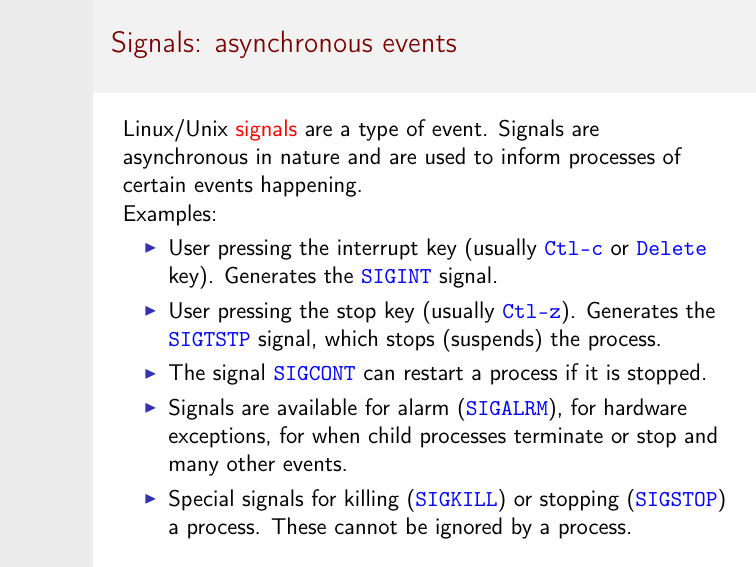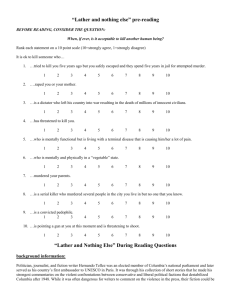Signals: asynchronous events
advertisement

Signals: asynchronous events
Linux/Unix signals are a type of event. Signals are
asynchronous in nature and are used to inform processes of
certain events happening.
Examples:
I
User pressing the interrupt key (usually Ctl-c or Delete
key). Generates the SIGINT signal.
I
User pressing the stop key (usually Ctl-z). Generates the
SIGTSTP signal, which stops (suspends) the process.
I
The signal SIGCONT can restart a process if it is stopped.
I
Signals are available for alarm (SIGALRM), for hardware
exceptions, for when child processes terminate or stop and
many other events.
I
Special signals for killing (SIGKILL) or stopping (SIGSTOP)
a process. These cannot be ignored by a process.
POSIX signals list
Read man signal and man 7 signal for more information.
SIGHUP
SIGINT
SIGQUIT
SIGILL
SIGABRT
SIGFPE
SIGKILL
SIGSEGV
SIGPIPE
SIGALRM
SIGTERM
SIGUSR1
SIGUSR2
SIGCHLD
SIGCONT
SIGSTOP
SIGTSTP
SIGTTIN
SIGTTOU
Hangup detected on controlling terminal
or death of controlling process
Interrupt from keyboard
Quit from keyboard
Illegal Instruction
Abort signal from abort
Floating point exception
Kill signal
Invalid memory reference
Broken pipe: write to pipe with no readers
Timer signal from alarm
Termination signal
User-defined signal 1
User-defined signal 2
Child stopped or terminated
Continue if stopped
Stop process
Stop signal from keyboard
tty input for background process
tty output for background process
Other Unix signals (not part of POSIX standard)
SIGTRAP
SIGIOT
SIGBUS
SIGSYS
SIGSTKFLT
SIGURG
SIGIO
SIGPOLL
SIGCLD
SIGXCPU
SIGXFSZ
SIGVTALRM
SIGPROF
SIGPWR
SIGINFO
SIGLOST
SIGWINCH
SIGUNUSED
Trace/breakpoint trap
IOT trap. A synonym for SIGABRT
Bus error
Bad argument to routine (SVID)
Stack fault on coprocessor
Urgent condition on socket (4.2 BSD)
I/O now possible (4.2 BSD)
A synonym for SIGIO (System V)
A synonym for SIGCHLD
CPU time limit exceeded (4.2 BSD)
File size limit exceeded (4.2 BSD)
Virtual alarm clock (4.2 BSD)
Profile alarm clock
Power failure (System V)
A synonym for SIGPWR
File lock lost
Window resize signal (4.3 BSD, Sun)
Unused signal
Signals (contd.)
I
For each signal there are three possible actions: default, ignore, or
catch. The system call signal() attempts to set what happens
when a signal is received. The prototype for the system call is:
void (* signal ( int signum , void (* handler )( int )))( int );
I
The above prototype can be made easier to read with a typedef as
shown below.
typedef void sighandler_t ( int );
sighandler_t * signal ( int , sighandler_t *);
I
The header file <signal.h> defines two special dummy functions
SIG_DFL and SIG_IGN for use as signal catching actions. For
example:
signal ( SIGALRM , SIG_IGN );
To kill or to really kill?
I
The system call kill() is used to send a specified signal to a specified
process. For example:
kill ( getpid () , SIGSTOP );
kill ( getpid () , SIGKILL );
kill ( pid , SIGCONT );
I
I
Special signals for killing (SIGKILL) or stopping (SIGSTOP) a process.
These cannot be ignored by a process.
Linux has a command named kill that invokes the kill() system call.
kill -s signal pid
kill -l --> list all signals
kill -9 --> send SIGKILL
I
To kill a process use kill -1 (SIGHUP) or kill -15 (SIGTERM) first to
give the process a chance to clean up before being killed (as those signals
can be caught). If that doesn’t work, then use kill -9 to send SIGKILL
signal that cannot be caught or ignored. In some circumstances, however,
even SIGKILL doesn’t work....
kill -9
Because I could not stop for Death,
He kindly stopped for me;
The carriage held but just ourselves
And Immortality.
...
Emily Dickinson
Examples
I
I
A simple signal handler example. Ignores CTRL+C and CTRL+Z
(and prints an annoying message). files-processes/sig-handler.c
A bigger example of systems programming. Sets a time limit on a
process. files-processes/timeout.c
In-Class exercise
I
Autosave? Consider the following C program sketch. Choose the
right answer that explains what the code does.
int main () {
/* ... */
signal ( SIGALRM , savestate );
alarm (10);
/* ... */
for (;;) {
/* do something */
}
}
void savestate ( int signo ) {
/* save the state to disk */
}
1. Saves the state of the program to disk every 10 seconds
2. Exits after saving the state of the program once to the disk after
10 seconds
3. Keeps running after saving the state of the program once to the
disk after 10 seconds
4. Exits after saving the state of the program twice to the disk after
10 seconds
5. Never saves the state of the program to the disk


